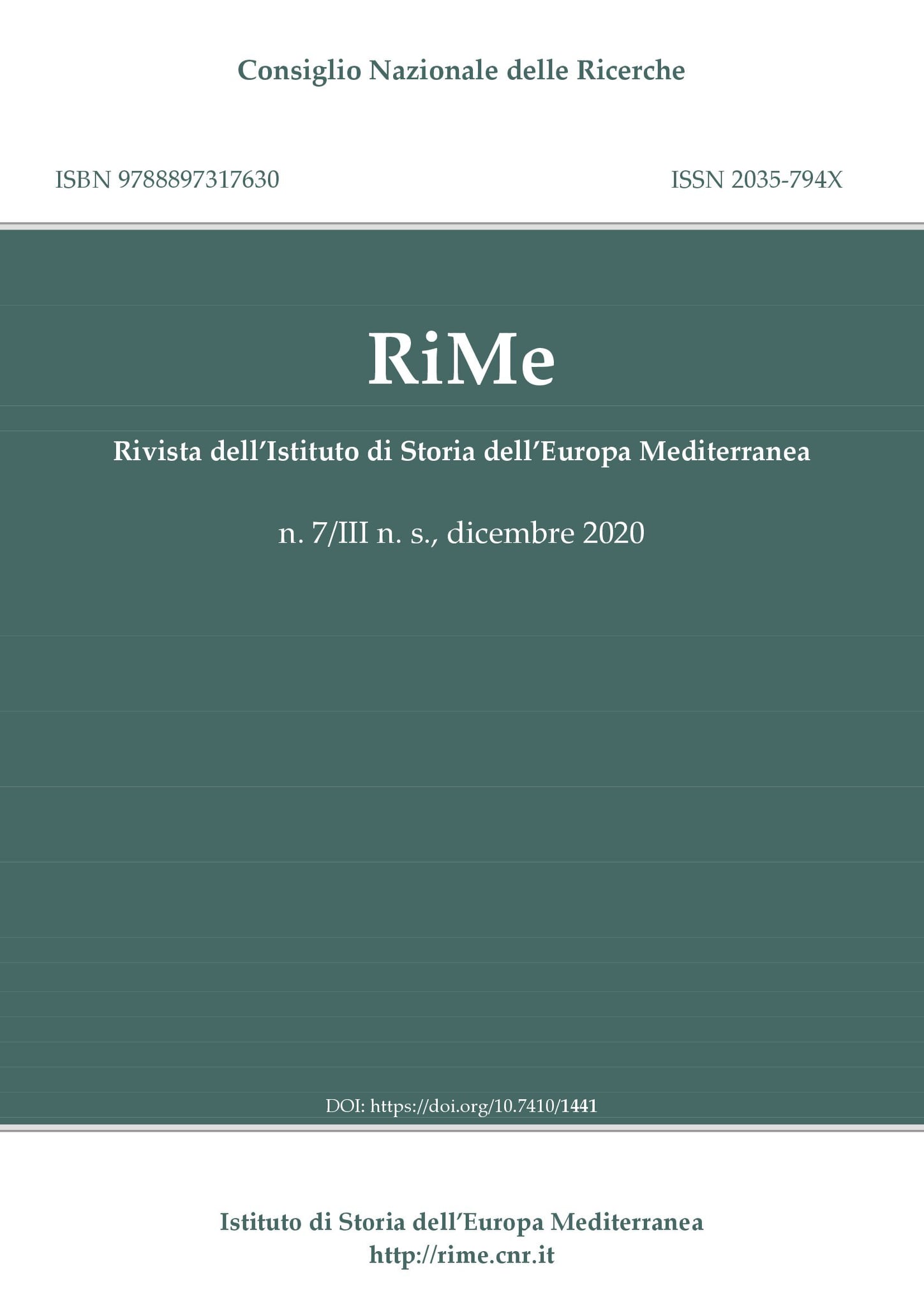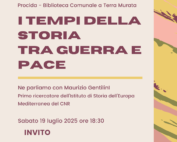
On the occasion of the publication of Volume 7 n.s. at the end of December 2020 I would like to express a few personal thanks which are, however, strictly pertinent to the life of the Review.
The first of these goes to my colleague and friend Esther Martí Sentañes, ho unfortunately finished her work for the Consiglio Nazionale delle Ricerche on 30 September 2020 and has therefore left her position as RiMe’s editorial secretary after many years of intense and fruitful collaboration. My wish is that she will soon be working with us again at the ISEM.
The second thanks goes to a number of people: Isabella Cecchini, Geltrude Macrì and Idamaria Fusco (the latter one of the two new editorial secretaries), new colleagues who joined our Institute in the summer of last year and who, after being appointed to the Editorial Board of RiMe, together with Sebastiana Nocco (the second of the two new editorial secretaries) have provided an enormous amount of time and goodwill in the new editorial work that has seen us busy with the synchronous publication of three issues.
To all of them, a sincere thanks for what they have done and will do.
Ad Maiora
Luciano Gallinari
Editor-in-Chief
RiMe. Rivista dell’Istituto di Storia dell’Europa mediterranea
On 31 December 2020 was published RiMe 7/I n.s., a Special Issue entitled “Culturas Mediterráneas y usos políticos de las representaciones nacionales en el siglo XX / Mediterranean cultures and political usages of national representations in the 20th century” edited by Marició Janué i Miret and Marcela Lucci. This booklet reflects on the political uses of national representations in the twentieth century, taking the Mediterranean as its location because it is a cultural threshold and space where two ideas combine simultaneously: that of connection and that of the frontier. Moreover, the proverbial pluriculturalism and mobility of the Mediterranean basin as an ideal geopolitical space in which to investigate the construction and reproduction of national identities. The particular interaction of cultures that have historically taken place in this area facilitates an approach to the transnational aspect of the construction of representations of the nation that goes beyond excessively Eurocentric frameworks. The editors of this issue are convinced that the study of the political representations of nations requires an interdisciplinary approach that integrates different perspectives from the human and social sciences: Political History, Nationalism, Imperialism and colonialism; the history of culture, cultural studies, social psychology and imagology in the History of Art; International History and Cultural Diplomacy; Transnational and Global History; Political Science and Sociology and the study of migration and exile.
On 31 December 2020 was published RiMe 7/II n.s., a Special Issue entitled “Memorias históricas, memorias incómodas. Una introducción / Historical memories, inconvenient memories. An introduction” edited by Maria Betlem Castellà i Pujols. The six articles it contains delve, from very different disciplines, methodologies and perspectives into the relegated and conflictive memories, in the clashes of memory and identities and in the stances that arise in different contexts: streets, public spaces, press, universities, social networks, institutions and/or governments.
Josefina Irurzun brings to the surface the faint memory of the associative beginnings of the Catalans in Buenos Aires; Martí Grau talk of the difficult memory of the European Union. Gustau Nerín suggests recovering the neglected memory of Spanish colonialism in Guinea. Luciano Gallinari examines different discourses generated by the assaults on the statues of Christopher Columbus and the Confederates in America, while Martí Grau i Segú presents the methodological proposals of the House of European History and the Jean Monnet House to reflect on the memory of the European Union; Jordi Guixé and Núria Ricart analyse the assaults on the statue of Antonio López y López in Barcelona, a man who made his fortune from trafficking goods and slaves. Finally, Mahdis Azarmandi highlights how post-colonial and racialised migrants question the historical memory of the city of Barcelona.
On 31 December 2020 was published RiMe 7/III n.s., a miscellaneous booklet that opens with an essay on the various elements that lead scholars to hypothesise that the Piscu Nuraghe area in Sardinia was also used in the Middle Ages, since the finds from that site cover a chronological span from the 16th century BC to the 7th century AD. The second text, on the other hand, is entirely devoted to the early Middle Ages and in particular to Byzantine artistic influences in the Visigothic Iberian Peninsula that were not directly linked to the imperial presence but to other artistic and historical-cultural dynamics. The third article presents a methodological approach to the study of the increasingly efficient commercial and banking firms in late medieval Europe, based on the structural analysis of two major Mediterranean firms that operated from Zaragoza and Barcelona in the first half of the fifteenth century. The fourth paper explain the history of privateering in the Marquisate of Finale (Liguria, Italy) during the Habsburg’s Age, with a particular reference to the 17th and 18th centuries: its origins and expansion and all the problems on legal and diplomatic levels. The fifth contribution analyses various aspects of the phenomenon of piracy and privateering, with emphasis on the Kingdom of Naples during the Austrian presence (1707-1734) due to the incessant incursions from Turkish-Barbary and French-Sicilian piracy. The sixth article focuses on the new needs of society that brought important changes in the use forms of leisure and the territory, also in the case of some religious sites that could be even new levers for the socio-economic development of inland and marginal areas in Sardinia too. The booklet also contains two book reviews and a review of a Webinar dedicated to the Cultural Heritage of Egypt and Italy, which took place online in December 2020.
Articolo pubblicato il 5 Febbraio 2021




